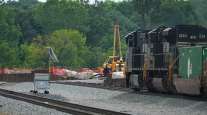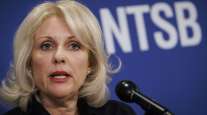Hart Says Truck and Pipeline Safety to Be Top Priorities as NTSB Chief
This story appears in the July 7 print edition of Transport Topics.
The Obama administration’s choice to lead a federal transportation safety agency has pledged to ensure the country’s elaborate pipeline system is well-maintained and roads and skyways are safe for the traveling public.
Christopher Hart, the nominee to be the next chairman of the National Transportation Safety Board, said he intends to guarantee the “vast pipeline network covering most of the United States” is well-maintained and safe for transporting chemicals.
“Proving the safety of our pipelines is achievable. It will take better industry oversight and the implementation of better safety standards, more timely responses when a problem occurs and improved education and outreach by pipeline operators to local jurisdictions to help ensure appropriate response in the event of an emergency,” Hart said in an interview that was featured on the NTSB’s website.
Hart was nominated June 26, and Senate transportation leaders have suggested a vote on his nomination could take place prior to the August congressional recess. The agency did not respond to requests for an interview.
President Obama, in a statement endorsing Hart and other nominees for top administrative posts, said they would “bring a depth of experience and tremendous dedication” to the positions.
Since 2009 Hart has served as NTSB’s vice chairman. In the top post, Hart indicated he would continue to draw attention to highway safety and the dangers of distracted driving.
Dave Osiecki, chief of national advocacy at American Trucking Associations, said the organization looks “forward to working with Hart as he takes on this important challenge.”
A Pipeline Safety Trust spokesman said the group applauds NTSB’s work and will follow Hart’s confirmation process.
If confirmed, he would be the 13th chairman, succeeding Deborah Hersman, who also was appointed by the president.
Hersman stepped down in April to become CEO of the National Safety Council, an Illinois-based nonprofit organization. She had backed the use of electronic logs in trucks and raised concerns about driver fatigue — positions Hart supports.
NTSB is an independent agency charged by Congress with investigating significant transportation accidents. NTSB said it has more than 400 employees and an annual budget of more than $100 million. The board was founded in 1967.
This summer, NTSB officials indicated they would release a final report detailing the collapse of a bridge in Washington state in 2013 along Interstate 5. The board also announced it is investigating a highly publicized traffic accident in June on the New Jersey Turnpike that killed one person and injured several others, including comedian Tracy Morgan.
Hart helped lead NTSB’s investigation of last year’s Asiana Airlines Flight 214 crash in San Francisco. It determined the crew relied heavily on automated systems.
“Automation has unquestionably made aviation safer and more efficient, but the more complex automation becomes, the more challenging it is to ensure that the pilots adequately understand it,” Hart told reporters.
NTSB is authorized by Congress to investigate every civil aviation crash in the United States.
National Business Aviation Administration President Ed Bolen commended Hart’s nomination. “We know from our work with him that he understands the importance of general aviation to America’s transportation system and its economy,” Bolen said.
Before joining the board, Hart was deputy director for Air Traffic Safety Oversight from 2005 to 2009 at the Federal Aviation Administration. He also was the assistant administrator for system safety at FAA from 1995 to 2005. Prior to the FAA, he was managing partner at the law firm Hart & Chavers from 1981 to 1990.




